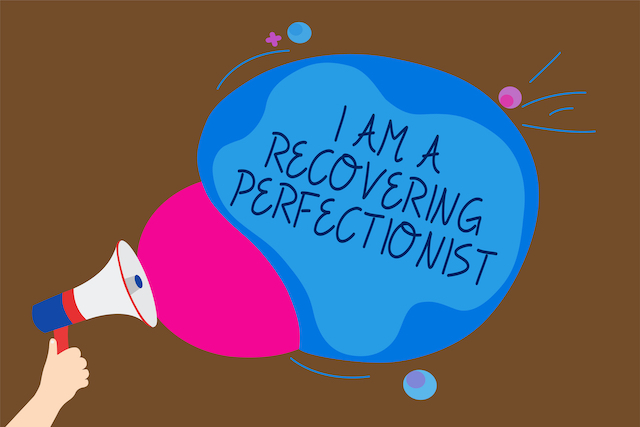
“A meaningful life is not being rich, being popular, or being perfect. It’s about being real, being humble, being able to share ourselves and touch the lives of others.” ~Unknown
Hello, I’m Kortney, and I’m a recovering perfectionist.
Like so many of us, I spent the greater part of my life believing that unless something was perfect, it wasn’t good at all. There was really no in-between. If it wasn’t perfect, it was a failure.
One of the problems with perfectionism is that it’s common to believe it’s a positive thing. In our society, people tend to value it. If you’re someone that aims for perfection, you must be accomplished. Driven. Smart.
Have you ever had a sense of pride over being called a perfectionist?
I have.
Have you ever thought about why?
Speaking for my own experience, when someone called me a perfectionist, I felt like even though I didn’t believe I was perfect, it meant that they were perceiving me as being perfect. They saw me as being one of the best, or as someone who was talented. It was validation that I was seen as someone who was good at things.
My rabid thirst for this sort of validation fed the perfectionist machine for years.
If you’re wondering what it means to be a perfectionist, here are a few traits:
- Perfectionists obsess over mistakes, even when it’s not likely that anyone else even noticed.
- Their self-confidence depends on being perfect.
- They think in black and white—things are either good or bad. Perfect or failure.
- They have unrealistic expectations and crazy-high standards for themselves and beat themselves up when they don’t meet them.
- They put up a front that everything is perfect, even when it’s not, because the thought of someone else seeing their imperfection is unbearable.
- Despite their quest for perfection, they don’t feel anywhere close to perfect.
- They can’t accept being second-best at something. That’s failure.
- They spend excessive time on projects because they’re always perfecting one last thing.
- They spend a lot of time searching for external approval.
- No matter what they do, they don’t feel good enough.
At one point in my life, all of those bullet points described me well. I wasted so much time worrying about approval and validation so that I could feel like I was awesome. But I never felt even close to awesome. I never felt good enough at anything.
Sure, there were times when I felt like I was good at something, but then I had to raise the bar. Just being good at something wasn’t enough. There was always another level to reach. The bar kept getting higher and higher, which isn’t necessarily a bad thing for people who are striving to make improvements in a healthy way, but for a perfectionist whose self-worth hinges on reaching the bar every time it’s raised, it’s not a positive.
It was exhausting.
After a lot of struggle in my life, I knew I needed to explore my perfectionist ways and find a way to be more compassionate toward myself. Perfectionism was holding me back from loving my life. And to be honest, I don’t think I intentionally set out to rid myself of the perfectionist mentality specifically. It came as a byproduct of a great deal of other personal work.
I began to realize that I had many beliefs that were etched into my brain that weren’t helpful. Beliefs that I never thought to question. These beliefs also severely hindered my ability to be happy and to live the life I wanted to live.
We all have belief systems that we don’t really think to question. We’ve grown up with them. We’ve learned them from the media, culture and society. But if we actually take a step back to notice that these thought patterns that inhibit our ability to grow and progress are there, we can start to question them.
Some common limiting beliefs that keep people stuck in perfectionism are:
- People reward me for having high standards. They are impressed and I gain approval.
- The only time I get positive attention is when I am striving for big things or achieving.
- If I make a mistake, I’m a failure.
- If only I can make so-and-so proud with my achievements, he/she will love me, and I’ll be happy.
- If I fail, I am worthless. Failing is not okay.
- If I don’t check over everything multiple times, I’ll miss something and look like an idiot.
- My accomplishments are worthless if they’re not perfect (i.e.: receiving a “B” instead of an “A” in a class is a failure),
- If others see my flaws, I won’t be accepted. They won’t like me.
The good news is that thoughts like these are examples of faulty thinking—faulty belief systems that keep you stuck in perfectionism. By identifying the specific thoughts and beliefs that keep you stuck in perfectionism, you can start to build new, more helpful thought patterns and belief systems.
I also stumbled upon another secret for overcoming perfectionism.
The secret is that I became okay with being average. I worked to embrace average.
If you’re a perfectionist, you know that being called average feels like the end of the world. It’s a terrible word to hear. My inner critic was not having it. “How dare you even think average is okay?” it hissed.
As a teenager, a twenty-something, and even a thirty-something, my world would have come to an end if I had accepted being average.
But sometimes life has a way of making you better.
Life has a way of putting things into your path and it presents opportunities for you to grow. Everyone has these opportunities at one point or another, but you have to notice them and choose to take advantage of them.
There was a time not too long ago when I went through a really difficult time and had to rebuild my life.
Looking back, I can see that the situation was an abrupt “lane-changer”—a push in a new direction to make a change. I was not living my best life and I wasn’t meant to stay stuck in that lane. I struggled with depression and anxiety, much of which was triggered by perfectionism.
By working on thoughts like the ones I listed above, and working to accept lowering my standards—the ones that told me that achievement and success were the only way I would be worth anything—I gradually learned to replace my old standards with this one:
Just be happy.
Learning to make this my standard led me to a place where I am okay with being average. Eek! I said it. Average.
Today, I can honestly say that I’m pretty happy with being average. Do I like to do well? Sure. But it doesn’t define my self-worth. While it’s created more space for me to fail, at the same time it’s created the space for me to succeed.
The difference is that my self-worth isn’t tied to whether I succeed or fail.
Here’s how I look at it:
I’m really good at some things, but I’m not very good at other things. You are really good at some things. And you aren’t very good at other things too. The good and the not-so-good all average out.
At the end of the day, we are all just average humans. We are all the same. We’re humans trying to live the best life we can. We are more similar than we are different.
Don’t you think that if we all ditched our quest to be perfect, or better than everyone else, we’d feel a little happier? Don’t you feel like we’d all be a little more connected?
If you struggle with perfectionism, I invite you to take a look at the list of limiting beliefs above and see what resonates for you. What evidence can you find that can disprove these limiting beliefs? What would you like to believe instead? Try on those new beliefs and build them up with new evidence to support them.
And along the way, work on accepting that you are enough, even if you’re average.
About Kortney Rivard
Kortney Rivard is a life and wellness coach and host of the podcast Real, Brave, & Unstoppable. She helps smart, passionate women rebuild their lives after a divorce, breakup, or other life transition by helping them get their bearings, discover what they really want, believe in themselves, and take action to create an authentic life they’re excited about living. Learn more at www.kortneyrivard.com.
- Web |
- More Posts













 Though I run this site, it is not mine. It's ours. It's not about me. It's about us. Your stories and your wisdom are just as meaningful as mine.
Though I run this site, it is not mine. It's ours. It's not about me. It's about us. Your stories and your wisdom are just as meaningful as mine.
Letting go of being at my very best for the people and things I care about the most just isn’t an option to me. For instance, I’m the driver for our family because I’m extremely careful, I’m not aggressive, I have cultivated awareness and reflexes that have kept my family and me safe for decades. I can’t ride with an “average” driver. I’m definitely a perfectionist, it’s stressful and difficult, and I’m very proud of the fact that I never take a shortcut with lives on the line. Frankly, I do not trust 90% of the other drivers out there. The pandemic has only solidified this attitude, because of the lack of real concern for others shown by those who avoid masking and basic public health practices. I don’t think we all need to stop pushing ourselves to be our best… in fact, I think life for all of us would be SO much better if EVERYONE ELSE would push themselves more. I know it won’t happen, though, because it’s work, and it’s hard, and it’s so much easier (as you’ve discovered) to relax and go with the flow, instead of planning ahead and being alert and otherwise demanding perfection from oneself. When an average person blows a stop sign or otherwise makes a mistake, I don’t want their error to hurt me… and I will always make sure that I do not hurt others. I similarly did not take the easy way on my career, my children, my hobbies, or my home. I just can’t envision changing now.
Thanks for your comment. First, there is a big difference between pushing yourself to grow and improve motivated by a desire to strive for excellence vs. being motivared by perfectionism. I want to be clear, that there is absolutely NOTHING wrong with wanting to achieve or set big goals. The difference is that perfectionists base their self-worth on their ability to achieve. Just wanted to make sure I was clear there.
Secondly, you bring up a good point in that you can’t envision changing right now. As a coach, I don’t EVER suggest anyone do work before they’re ready to. That’s a measure that only you have and only you can know if you feel the need to change or are ready to start the process of doing that work. I commend you on your self-awareness and ability to recognize this isn’t the time for you to make changes. Maybe someday that will change, and maybe it won’t, but what’s important is that you know what is right and true for you. Thanks for commenting!